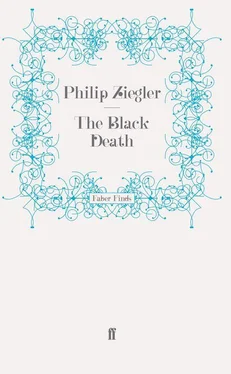* * *
The plague got a firm grip in Wiltshire before a significant number of cases occurred in neighbouring Hampshire. The lists of institutions to the benefices of Hampshire, assuming the usual gap of a month to six weeks between mortality and replacement, suggest that the first deaths took place at the very end of 1348, that the worst months were February and March 1349, and that things were more or less back to normal by the end of the year. {274}
But three months before the plague had struck, on 24 October 1348, William Edendon, alias Edyndon or Edyngton, Bishop of Winchester and former Royal Treasurer, had sent out warning orders to all the clergy of his diocese. {275}
‘A voice in Rama has been heard’; he lamented, ‘much weeping and crying has sounded throughout the various countries of the globe. Nations, deprived of their children in the abyss of an unheard-of plague, refuse to be consoled because, as is terrible to hear, cities, towns, castles and villages, adorned with noble and handsome buildings and wont up to the present to rejoice in an illustrious people, in their wisdom and counsel, in their strength and in the beauty of their matrons and virgins; wherein too every joy abounded and whither multitudes of people flocked from afar for relief: all these have already been stripped of their population by the calamity of the said pestilence, more cruel than any two-edged sword. And into these said places now none dare enter but fly far from them as from the dens of wild beasts. Every joy has ceased in them; pleasant sounds are hushed and every note of gladness is banished. They have become abodes of horror and a very wilderness; fruitful country places without the tillers, thus carried off, are deserts and abandoned to barrenness.’
Whether the inhabitants of these erstwhile earthly paradises would have recognized them from Edendon’s description may be doubtful but the picture of the fate which had overtaken them must have caused dismay in the minds of all his readers. For, went on the Bishop:
…this cruel plague, as we have heard, has already begun singularly to afflict the various coasts of the realm of England. We are struck by the greatest fear lest, which God forbid, the fell disease ravage any part of our city and diocese. And although God, to prove our patience and justly to punish our sins, often afflicts us, it is not in man’s power to judge the divine counsels. Still, it is much to be feared that man’s sensuality which, propagated by the tendency of the old sin of Adam, from youth inclines to all evil, has now fallen into deeper malice and justly provoked the Divine wrath by a multitude of sins to this chastisement.
To avert this doom the Bishop instructed his clergy to exhort their flocks to attend the sacrament of penance; on Sundays, Wednesdays and Fridays to join in saying the seven penitential and the fifteen gradual psalms and to take part, barefoot and with heads bowed, in processions around the market place or through the churchyards, reciting the greater litany. Three weeks later, while staying at Esher, he followed up this mandate with a further letter reminding the people ‘that sickness and premature death often come from sin and that, by the healing of souls, this kind of sickness is known to cease’. {276}
But belated penitence availed nothing. The plague struck the diocese of Winchester with especial violence. 48.8 per cent of all beneficed clergy died, a figure not exceeded in any other diocese of England. {277} One explanation of this high mortality may be that the coastline of Hampshire was particularly exposed to ship-borne infection; the other two dioceses to suffer most were those of Exeter and Norwich, both of them similarly vulnerable. But it is difficult to make any sensible deductions valid for the whole of England about the factors which made any given area a ready target for the plague. In one region the hilly country seemed to suffer most, in another the plains. The fens of East Anglia escaped lightly, yet the valleys of the Severn and the Thames were devastated. The coast of Hampshire was much affected, yet Kent was relatively little damaged. Nowhere was immune but it seemed that only when the plague had come and gone could any town or county know whether or not it would prove especially susceptible.
In Crawley the population dropped from four hundred in 1307 to only a hundred and eighty in 1673. It did not reach four hundred again until 1851. {278} Certainly the Black Death was not alone responsible for what must have been a protracted process of depopulation. But the rapid changes in the methods used in the cultivation of the manorial demesne, in particular as regards the number of weekly workers, which immediately followed the epidemic show how much it must have affected the available labour force. {279} Prior to 1349 the reeve of Crawley, on behalf of his landlord, the Bishop of Winchester, was happy to receive ‘fees for annual recognition’, that is to say, fees paid by villeins for the privilege of staying away from the manor to which they belonged. After this date no more such fees were received. Given the dearth of labour that then existed no landlord would willingly allow his villeins to deprive him of their services. Certainly the villeins did wander abroad, with greater frequency and success even than before the plague; but it was in defiance of their landlord and the law of the land.
Hampshire’s off-shore islands suffered no less than the mainland. {280} The Isle of Wight was so reduced in population that, in 1350, the King remitted the tax due from the royal tenants. Almost every benfice in the island became vacant during the plague. Hayling Island, off Portsmouth, suffered quite as badly. ‘Moreover’, said a royal declaration of 1352, ‘since the greater part of the said population died whilst the plague was raging, now, through the dearth of servants and labourers, the inhabitants are oppressed and daily are falling most miserably into greater poverty.’ {281} For these unfortunates, too, a reduced rate of taxation was conceded.
Winchester, the ancient capital of England, was as severely affected as any large town in the country. As usual it is difficult to establish either how large the population was before the plague or what percentage perished. Professor Russell has calculated that, in 1148, the population was about 7,200 and that, by 1377, the year of the poll tax, it had dropped to a mere 2,160. {282} Almost certainly numbers would have grown between 1148 and 1300 and dropped only slightly, if at all, between 1300 and 1348. The population at the latter date could not have been less than 8,000 and was perhaps as much as 9,000 or 10,000. If one guessed that the Black Death killed 4,000 people in the city the estimate would probably be conservative.
By January 1349 deaths were running at such a level that the existing burial grounds were overcrowded. The Church insisted that all burials must take place in consecrated ground; the populace, more concerned with hygiene than theology, insisted with equal vigour that the bodies of the plague victims must be taken outside the city walls and buried in a common pit. When a monk from St Swithun’s, the priory of the Cathedral, was conducting a burial service in the central churchyard, an angry crowd broke in and attacked and wounded him. The Bishop, outraged at this aggression by ‘low class strangers and degenerate sons of the church’ against a man ‘whom, by his habit and tonsure, they knew to be a monk’, ordered the excommunication of the guilty. At the same time he gave the indignant citizens most of what they wanted – ordering the rapid enlargement of the existing graveyards and the opening of new ones away from the centre of the town. He explained, for the benefit of the less well-informed members of his flock, that, since the Catholic Church believed in the resurrection of the dead, it was important that their corpses should be buried ‘not in profane places, but in specially enclosed and consecrated cemeteries, or churches where with due reverence they are kept, like the relics of the Saints, till the day of Resurrection’. {283}
Читать дальше












